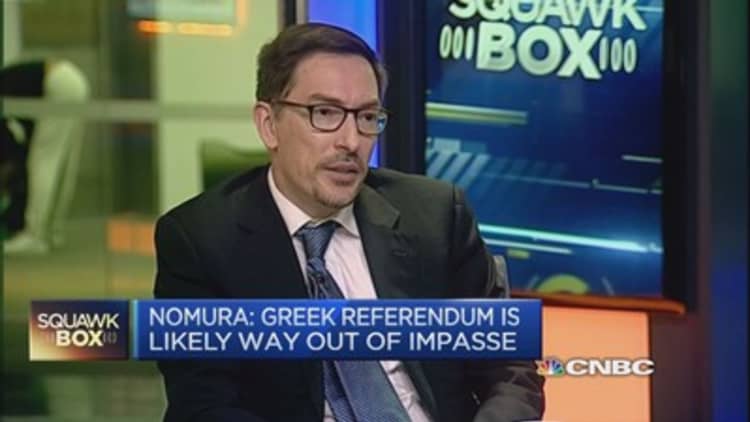
As Greece stumbles closer to bankruptcy with no agreement in sight to unlock cash from its international creditors in return for a reform plan, talk has grown of just how a default could play out.
Investment banks Goldman Sachs and UBS reiterated on Monday that Greece's exit from the single currency zone was not their main-case scenario for the region's most indebted country.
Read More We should let Greece go bankrupt: Ifo's Sinn
Still, an exit or "Grexit" remains one of the possible paths Greece faces, analysts said:
1) Fast exit from euro zone:
If the Eurosystem -- the European Central Bank and the central banks of euro zone members -- refuses to finance Greece by halting the release of more emergency loans through the Emergency Liquidity Assistance (ELA), there could be a rapid withdrawal of deposits from Greek banks, UBS forecast in a note on Monday.
Athens would then need to refinance the banking system by creating a new currency to do so, UBS said. "However, this could probably be slowed with the imposition of capital controls limiting deposit withdrawal," the bank added.
2) Slow exit from euro zone:
Faced with low funds, Greece could substitute "IOU's" for euros in some of its payments. This could start with payments to suppliers and possibly extended to public sector salaries and pensions.
"As current Greek debt obligations are not valued at their face value by the bond market, nor would these notes be, meaning that their purchasing power would likely be lower than that of the euro. In this way, the parallel currency would already be devalued," UBS said.
Read More The Greek crisis has a new buzzword: Grimbo
It added that the more of these notes that were issued, the greater the need would be for the banking system to clear payments in them. This could lead to more euros leaking out of the Greek banking system and the economy relying more on the new currency.
"Nominally, Greece could (in theory, and just conceivably) remain in the euro under these circumstances, but there would come a point in this process at which it had in a practical sense already left," UBS said.
3) Default with no Grexit:
There is now a 50 percent chance of some form of Greek sovereign debt default, JP Morgan Asset Management Chief Market Strategist Stephanie Flanders said in a note WHEN?.
"Carefully handled, a partial default does not have cause lasting damage to Greece or European markets. Nor does it have to lead to a Greek exit from the euro zone," she said.
Goldman Sachs added that even if Greece defaults on a debt payment "while negotiations are still ongoing, a deal will be found keeping the integrity of the monetary union intact."
Jeroen Dijsselbloem, the Dutch finance minister who chaired the meeting of euro zone finance ministers in the Latvian capital Riga on Friday, said progress in talks with Greece would be reviewed again on May 11 – a day before Greece is due to make a key 750 million ($813 million) euro payment to the International Monetary Fund.
"We don't know what it means in this environment to default and stay in the euro zone, when capital flows out of Greece could be astoundingly large," Brian Singer, head of dynamic allocation strategies, at asset management firm William Blair told CNBC Monday.
Follow us on Twitter: @CNBCWorld


